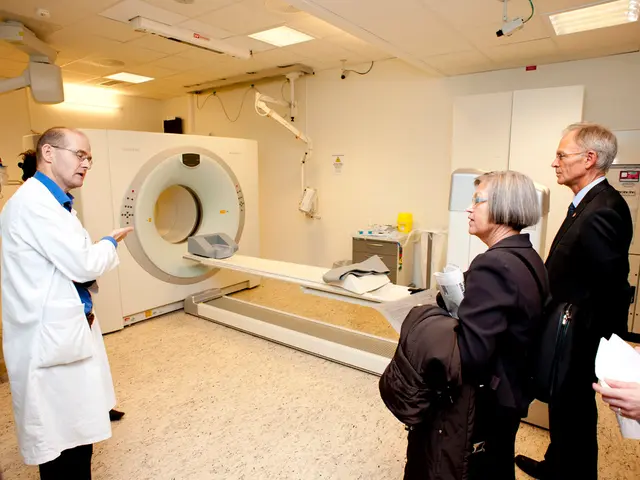Rapid and severe rosacea outbreak: Understanding triggers, identifying signs, and managing remedies
Rosacea Fulminans: The Intense, Inflammatory Skin Condition
Rosacea fulminans, an extreme version of rosacea, strikes suddenly, leaving redness, swelling, and painful pustules on the central parts of the face – chin, cheeks, and nose. This condition, often referred to as pyoderma faciale, is quite rare and different from regular rosacea or acne due to its severity and rapid onset.
Although the root cause of rosacea fulminans is a mystery, scientific findings hint at potential associations with other health issues, such as inflammatory bowel disease and pregnancy [1]. Additionally, rosacea fulminans might be more likely to manifest in individuals who have experienced rosacea before.
Some potential triggers of rosacea fulminans include emotional stress, hormonal fluctuations, and certain medications [2]. Moreover, dietary choices might play a role in aggravating rosacea symptoms [1]. Potential triggering foods include spicy meals, alcohol, and foods containing cinnamaldehyde, like tomatoes, citrus fruits, or chocolate.
When it comes to dealing with rosacea, healthcare professionals might prescribe oral isotretinoin – a potent acne medicine – or corticosteroids. Antibiotics combined with corticosteroids and lifestyle alterations could potentially resolve symptoms [3].
A healthcare practitioner may suggest individuals make changes to reduce stress through activities like meditation, deep breathing exercises, regular exercise, or journaling. They may also advise dietary adjustments, such as limiting alcohol consumption. Using gentle skincare products on the face is crucial as well. Combining these strategies with medical treatments can lead to better symptom management and a higher quality of life [3].
Contact a dermatologist or healthcare professional if symptoms go beyond regular rosacea or acne, appear suddenly, persist despite providing self-care, or if eye irritation or inflammation occurs [3]. Prompt treatment can prevent scarring, infections, and other complications associated with rosacea fulminans while also tackling any emotional distress that comes with the condition. With specialized care tailored to their needs, individuals with rosacea fulminans can work towards managing their condition and improving their overall quality of life.
[1] Enrichment Data: Several studies suggest a possible link between rosacea fulminans and other health conditions like inflammatory bowel disease and pregnancy. It is worth noting that these connections are not definitive and require additional research.
[2] Enrichment Data: Apart from emotional stress and hormonal fluctuations, medications could potentially induce or worsen rosacea symptoms. Medical professionals may find it helpful to discuss medication options with their patients, taking care to consider the potential impact on rosacea.
[3] Enrichment Data: In severe cases of rosacea, including rosacea fulminans, isotretinoin (Accutane) might be used as a treatment. However, its administration should always be overseen by a medical professional due to its potential side effects and risks.
- Rosacea fulminans, a severe skin condition, shares potential associations with other medical conditions such as inflammatory bowel disease and pregnancy, according to scientific findings.
- Some skin-conditions, like rosacea, may be exacerbated by certain medications, and medical professionals should discuss medication options with their patients to consider the potential impact on the condition.
- In addition to medical treatments, women's health and health-and-wellness strategies like stress reduction, dietary adjustments, and gentle skincare products can help manage symptoms of rosacea, particularly rosacea fulminans.
- Specialized care from a dermatologist or healthcare professional is crucial for individuals experiencing rosacea fulminans, a women's health issue characterized by intense, inflammatory skin symptoms, as prompt treatment can prevent complications and improve quality of life.








